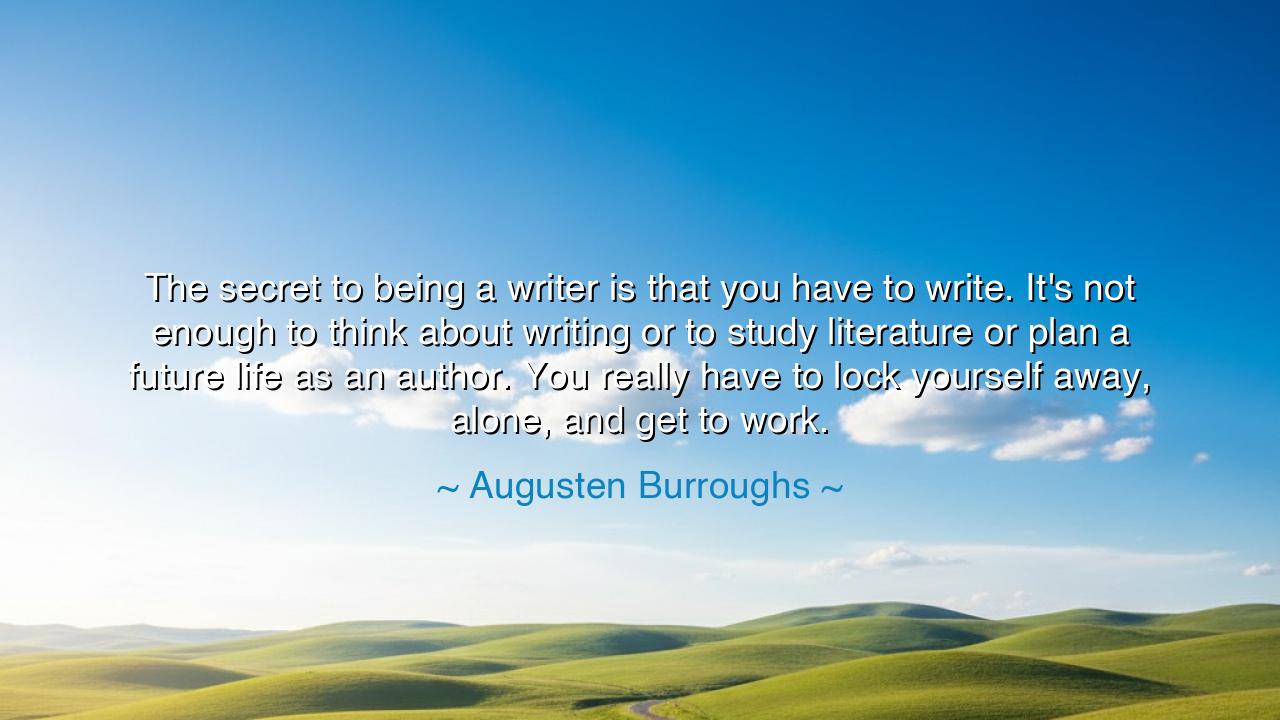
The secret to being a writer is that you have to write. It's not
The secret to being a writer is that you have to write. It's not enough to think about writing or to study literature or plan a future life as an author. You really have to lock yourself away, alone, and get to work.






In the plain yet piercing words of Augusten Burroughs, we find the eternal truth of all creation: “The secret to being a writer is that you have to write. It’s not enough to think about writing or to study literature or plan a future life as an author. You really have to lock yourself away, alone, and get to work.” Beneath its simplicity lies the iron law of all craft—that action is the breath of art, and that discipline, not inspiration, gives birth to mastery. These are not the words of a dreamer, but of one who has faced the page, day after day, and learned that genius is not a gift bestowed, but a fire tended in solitude.
Burroughs, known for his fierce honesty and raw insight into the human soul, spoke from experience. His own life was a struggle against chaos—yet through writing, he carved meaning out of disorder. His words remind us that every artist must walk through the valley of effort before they reach the mountain of creation. To write is not to wait for the muse, but to meet her in the quiet hours when all excuses have fallen away. The writer’s task is not to dream of writing, but to write; not to imagine stories, but to bring them forth through labor and persistence. In this, Burroughs echoes the wisdom of the ancients, who knew that all creation—whether of word, stone, or melody—demands sacrifice.
The meaning of this saying stretches far beyond the craft of writing. It speaks to the discipline of all endeavor, to the truth that thought without action is barren. In every art and every labor, there are those who talk and those who toil. The talkers imagine, the toilers become. Just as a seed will not bloom unless buried in the soil, so too must one’s ideas descend from the mind into the realm of effort. To “lock yourself away, alone, and get to work” is the modern echo of the monk entering the cell, the sculptor retreating to his marble, the musician closing the door to chase perfection note by note. Solitude is not a prison, but a forge.
Consider Michelangelo, who spent four years beneath the vault of the Sistine Chapel, lying on scaffolding, painting through pain and exhaustion. He did not dream of glory; he wrestled daily with the stubborn plaster and the unyielding brush. Every stroke was an act of will. Or think of Emily Dickinson, who, in the quiet of her small room, wrote over 1,800 poems—most of which she never saw published. Alone, she created a world of eternal beauty from the dust of silence. These were souls who understood what Burroughs speaks of: that the secret of the creator is not magic—it is devotion, measured not in moments of inspiration, but in hours of unseen labor.
The path of the writer—and indeed of any maker—is one of solitude. For creation demands that we withdraw from the distractions of the world, that we face ourselves without disguise. The page is a mirror, and the act of writing reveals both our greatness and our frailty. To “lock yourself away” is not an act of isolation, but of commitment; it is a ritual of faith, a declaration that what is within must be brought forth into the light. The one who dares this work learns that creativity is not found in comfort, but in confrontation—the confrontation between thought and expression, between vision and imperfection.
Yet, this solitude bears a quiet joy. For in the act of working—whether writing, painting, or building—one enters into communion with all who have ever labored toward truth. Every line written in silence joins the chorus of human effort that has spanned the ages. To work with persistence is to join hands with Homer and Dante, Shakespeare and Woolf, with every soul who ever turned their inner fire into form. The solitude of the creator is thus never truly lonely—it is filled with unseen company.
The lesson, then, is as simple as it is demanding: Do not wait for permission to begin. Do not waste your strength in dreaming of what could be. Begin, even if your hands tremble. Set aside the noise of the world, close the door, and write—write badly, write bravely, but write. For the act itself is the alchemy that turns potential into power. Discipline is the mother of inspiration, not its servant.
So, O seeker of the creative flame, remember this truth: you will never become the thing you wish to be unless you do the work. The muse visits only those who have already begun. Do not think of writing—write. Do not plan to live—live. For it is through the act, not the idea, that your destiny takes shape. And when at last you have faced the silence, when you have written through doubt and solitude, you will discover that you have not merely produced words—you have become a creator, one who brings forth light from darkness, and meaning from the void.






AAdministratorAdministrator
Welcome, honored guests. Please leave a comment, we will respond soon